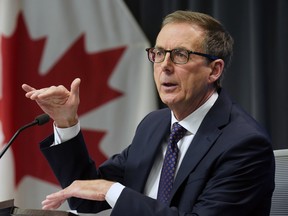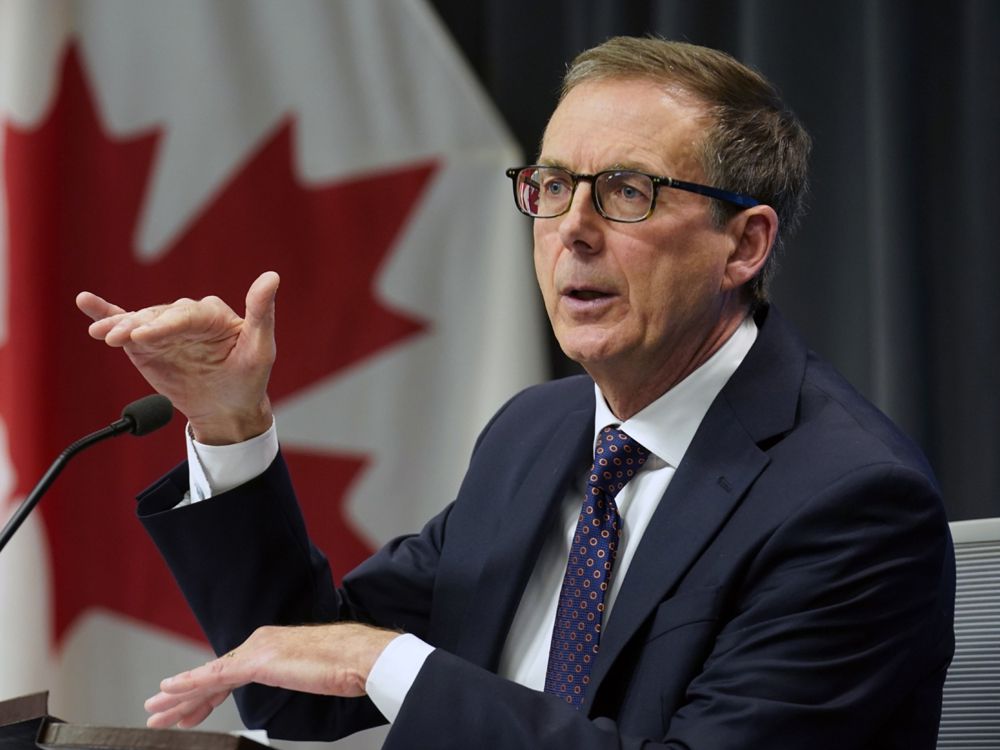Kevin Carmichael: Rate hikes will not be on autopilot, says Bank of Canada

Article content
Bank of Canada governor Tiff Macklem said the current inflation scare is mostly a supply issue. If he’s right, the central bank’s path back to higher interest rates might not be as steep as some on Bay Street currently think it will be.
Advertisement
This advertisement has not loaded yet, but your article continues below.
Article content
The Bank of Canada’s latest economic outlook has year-over-year increases in the consumer price index averaging 5.1 per cent this quarter, well outside policy-makers’ comfort zone of one per cent to three per cent.
Inflation at that pace leaves the central bank with little choice but to raise interest rates. The central bank’s marching orders from the government call on it to keep the consumer price index advancing at an annual rate of about two per cent, the midpoint of that comfort zone. Forecasters at Bank of Nova Scotia predict that will require lifting the benchmark interest rate to two per cent by the end of the year. The rate is currently at an emergency setting of 0.25 per cent, about as close to zero as it can get without unduly disputing financial markets.
Advertisement
This advertisement has not loaded yet, but your article continues below.
Article content
Canada’s economy no longer requires emergency stimulus. Employment returned to where it would have been if the COVID recession hadn’t interrupted hiring trends at the end of last year, and gross domestic product is back at pre-pandemic levels. With the economy healed, policy-makers turned their attention to inflation at their latest interest-rate meetings, opting to end a promise to keep borrowing costs near zero until at least the spring. Macklem left little doubt that he and his deputies will raise the benchmark rate on March 2, the next scheduled interest-rate announcement.
“The economy will need higher interest rates to moderate growth in spending and bring demand in line with supply,” Mackelm said in a speech at a conference hosted by the Canadian Chamber of Commerce on Wednesday, Feb. 9. “We also agreed that we must keep inflation expectations well anchored. If inflation expectations become unmoored, the costs of getting inflation back to target will be much higher. For both of these reasons, we signalled with unusual clarity that Canadians should expect a rising path for interest rates.”
Advertisement
This advertisement has not loaded yet, but your article continues below.
Article content
Unusual clarity isn’t perfect clarity. Macklem has resisted saying too much about how fast he will raise interest rates, and at what level he might stop. He indicated in a press conference on Jan. 26 that it would be reasonable to expect a quick pace of increases in the beginning, given the benchmark rate is essentially at zero compared with 1.75 per cent at the start of the pandemic. But he warned against thinking that the central bank was on autopilot. He said he and his deputies could choose to take a break as they get closer to two per cent.
-

Canada loses 200,000 jobs, nearly double the blow economists expected
-

Bank of Canada governor says it’s unclear how quickly inflation will drop
-

Tiff Macklem stokes doubts about usefulness of forward guidance
Advertisement
This advertisement has not loaded yet, but your article continues below.
Article content
Something Macklem said earlier in his speech could shed some light on how policy-makers are thinking about inflation.
At the start of last year, central bankers insisted that inflation would be temporary, arguing that acute supply shortages would be resolved as soon as clever executives and logistics experts figured out how to navigate supply bottlenecks. That didn’t happen, and by the end of the year, policy-makers such as Macklem conceded they had a problem. The Bank of Canada, the Federal Reserve in the United States, and other central banks all started raising interest rates or advancing plans to do so.
But Macklem hasn’t stopped thinking that inflation is primarily a supply phenomenon. That’s important because higher interest rates can’t do much about inflation that’s being driven by congested ports, Asian factories that close for COVID outbreaks and droughts brought by climate change. Macklem made a point of pushing back against arguments that his policies and fiscal stimulus were the main source of inflation.
“It is not the result of generalized excess demand in the Canadian economy,” Macklem said. “Our economy is only just now getting back to full capacity.”
The Bank of Canada does have influence over demand. Macklem seems to think demand isn’t the issue. If supply gets back to normal, the path to higher interest rates could be flatter.
• Email: kcarmichael@postmedia.com | Twitter: carmichaelkevin
Advertisement
This advertisement has not loaded yet, but your article continues below.


